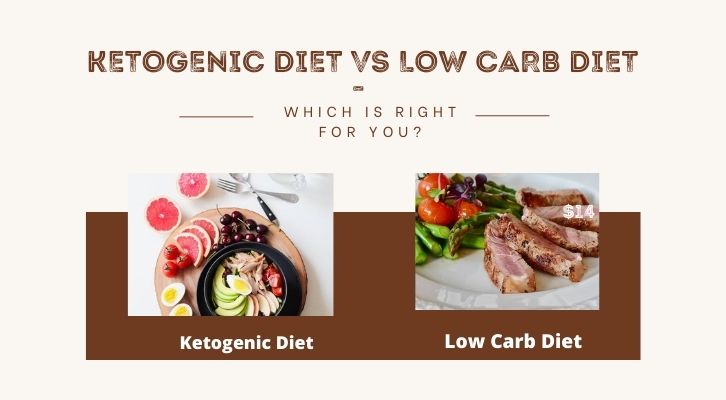Ketogenic Diet Vs Low Carb Diet – Which Is Right For You?: If you are looking for a change in your daily routine diet then you can try these two options. Ketogenic diets basically restrict carbohydrate intake to generally not more than 30 to 50 grams per day with increased fat consumption while low carb diets encourage consumption of a high-protein and high-fat diet with minimal carbohydrate intake.
Here, In this article, we’ll show the importance of both the ketogenic diet vs the low-carb diet and compare their pros and cons.
In the past few years, we have seen a dramatic rise in the popularity of adopting the ketogenic diet for weight loss and health goals. But today we will know its pros and cons, and its comparison.
Ketogenic Diet vs. Low Carb Diet: What’s the Difference?
We all know losing weight is a hard task no matter what diet you follow, but there are two popular diets you may want to consider – the low-carb diet and the keto diet. Many people get confused, as these two are sounding similar diets. People think that both are the same or think a low-carb means cutting carbs, but find out below how they really work.

What is a Ketogenic Diet?
A ketogenic diet is a high-fat, low-carbohydrate diet that is designed to promote weight loss and improve overall health. Unlike most other diets, a ketogenic diet requires the individual to consume a large amount of fat and very few carbohydrates. This allows the body to enter a state of ketosis, in which it burns fat for energy instead of glucose.
There are different types of ketogenic diets, but they all have one common goal: to induce ketosis in the body. Ketosis can be beneficial for weight loss, blood sugar control, and improved mental clarity and focus. It also has a number of other potential health benefits, including reduced inflammation and improved cholesterol levels.
If you are thinking about starting a ketogenic diet, it is important to consult with your doctor first. This is essential if you have any existing medical conditions or taking any medications. Once you have been cleared by your doctor, you can start planning your meals and creating a healthy ketogenic diet that works for you.
What are the risks of following the Ketogenic Diet?
Most people are able to follow a ketogenic diet and enjoy the weight loss benefits and increased energy levels. However, there are certain people that may experience adverse effects from following such a strict diet plan for long periods of time. These include: Inability to tolerate fat on the menu, gastrointestinal discomfort, lack of fiber in your food, increased thirst, rashes or acne/redness on your skin, headaches, and irritability
What are the benefits of following the Ketogenic Diet?
The ketogenic diet plan encourages you to eat small amounts of high-fat, high-protein foods and drink lots of water. It has been used for decades (even before keto was a thing) to help you lose weight. It involves cutting out all sugar, starches, and processed foods from your diet, focusing on good fats like avocados and coconut oil, eating high amounts of protein, and then gradually reintroducing carbohydrates over time.
Is the Ketogenic diet for you?
People are following a ketogenic diet for weight loss, it reduces hunger, improves insulin sensitivity, and increased fat burning. Some of the other benefits include a reduced risk of type 2 diabetes, less abdominal fat, and improved heart health, along with a reduced risk of cancer. So if you have these health problems, then the Ketogenic diet is for you but you should consult with your doctor before implementing it.

What is a Low Carb Diet, is it right for you?
A low-carb diet actually lowers the intake of carbohydrates consumption, it replaces them with fat and proteins. This can be achieved by eating high protein and low carbohydrate foods, including meats, eggs, fish, vegetables, and low-fat dairy foods. In general, low-carb diets force the body to use its fat stores as fuel rather than sugar, which reduces cravings and increases satiety.
Studies have shown a low-carb diet can be an effective weight loss strategy. It helps you lose weight in the same way that a calorie-restricted diet does, but without the hunger pangs of restriction.
Benefits of Low-Carb diet
People can lose weight if they restrict calorie intake and increases physical activity. Low-carb diets, especially very low-carb diets, may lead to greater short-term weight loss than low-fat diets. Only cutting calories and carbs will not be sufficient for weight loss with low-carb diets.
Several studies showed that the extra protein and fat help people to feel full longer time, which ultimately helps them eat less. Other than this it also helps to lower the risk of type 2 diabetes and heart diseases, as shedding extra weight may have improved blood sugar and cholesterol levels.
Risk of following a Low-carbs diet
A sudden reduction of carbs from your diet can cause temporary side effects such as constipation, headache, and Muscle cramps. You may also feel some other side effects like bad breath, fatigue, and weakness sometimes due to severe carb restrictions from your diet.
Conclusion
Some health experts believe that if you eat large amounts of fat and protein from animal sources, your risk of heart disease or certain cancers may actually increase.
If you opt to follow a low-carb diet, pay attention to the fats and proteins you choose. Limit foods with saturated and trans fats, such as meat and high-fat dairy products, which may increase your risk for heart disease.
If you like the posit “Ketogenic Diet Vs Low Carb Diet – Which Is Right For You?” then please share it with others
You may also like to read-How to lose weight with Ketogenic Diet and its benefits

